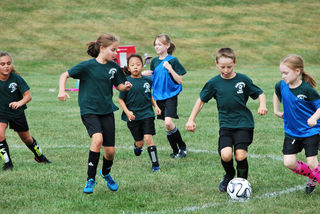
Personality
The Personality of Great Soccer Players
Hard work doesn’t always look like hard work.
Posted July 12, 2018

While watching the World Cup, I was reminded how the on-field personalities of great soccer players teach me that hard work changes over our lifespan. Teams that are winning seem to use less effort than teams that are losing. They seem to move less. How is this possible? Does winning require laziness?
In life, I think we’ve all probably observed that effort in soccer isn’t the same as success. At one end of the scale are young soccer teams, who play a style of mob soccer where everybody uses effort to constantly run to the last known location of the ball, much like Blinky in Pacman.
At the other end of the scale are great players like Zidane or Messi, who seemingly spend (or spent) much of the game doing very little, just walking around. If you’ve never seen Zidane: A 21st Century Portrait, I recommend it highly, just count how much time Zidane spends pulling up his socks and looking around.
But are great players just so good that they can succeed without trying, or is ‘not trying’ an essential part of greatness?
The phenomenon of social loafing provides the answer we need. Social loafing is the general observation that people put in less effort when they think they are working with others than when they are working alone. This was first demonstrated in a controlled manner by Latané, Williams and Harkins, who had people clap their hands as loudly as they could (as if they were cheering their favorite sports team). The participants were receiving instructions to clap via heavy headphones, and when they thought they were clapping with others, they clapped less loudly than when they believed they were clapping alone. The even stronger pattern was that the more people they thought they were clapping with, the greater the reduction in cheering.
But why did they put in less effort? There are two basic explanations for social loafing: co-ordination loss and motivation loss. Motivation loss is the idea that people choose to put in less effort (e.g. “I don’t feel like clapping”, “I can get away without clapping”, “why bother?”). Co-ordination loss is when part of someone’s energy gets diverted into co-ordinating their actions with others. In the context of clapping, it would be trying to match someone else’s clapping rate.
But there is a third explanation that is less often used: sometimes, we socially loaf in order to make the group efficient. When clapping with others, everyone’s soundwaves partly cancel each other’s sound waves (this is basic physics). So, we could clap less because we know it doesn’t make a difference and are depressed, but just as equally because we are saving energy for a time when it can make a difference. And, note, that from the outside, it’s hard to know which of these explanations is real. We really only know it from how people act in many situations. Like, do these people pick up the cheering slack when their friends has to answer the phone in the middle of watching the game?
And here we get back to soccer. Great soccer players don’t suffer from motivation loss or simply coast, they are waiting for a time when they can make a difference. What looks like laziness is actually a combination of the second and third reasons of co-ordinating with teammates and creating efficiency. As soon as the play looks like it is turning towards them, the great players are totally engaged, ready to contribute.
Mature hard workers have goals such as being efficient while immature hard workers have goals such as always running at 110 percent. Mature soccer players may appear to do very little, but, if you know what to look for, they give to the team by doing precisely what the team needs.
Last post, I suggested that, as extraversion matures, it may become increasingly harder to detect. This post, we see that mature conscientiousness (the Big Five name for the tendencies of a hard worker) is also harder to detect the more mature it is. Sometimes, hard work doesn’t look like hard work. You have to know what to look for in order to see the pattern. You only know whether some soccer players are good if you actually understand the game well enough to know if they were in or out of position, and what the structure of the play was meant to look like. So, if you can recognize that, you know a lot about soccer, and I hope you enjoy the final.
References
Latane, B., Williams, K., & Harkins, S. (1979). Many Hands Make Light The Work: The Causes and Consequences of Social Loafing. Journal of Personality and Social Psychology, 37, 822-832.

